Ali: Fear Eats the Soul Blu-ray Movie
HomeAli: Fear Eats the Soul Blu-ray Movie 
Angst essen Seele aufCriterion | 1974 | 93 min | Not rated | Sep 30, 2014
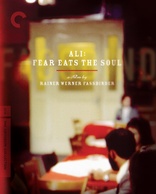
Movie rating
7.9 | / 10 |
Blu-ray rating
| Users | 0.0 | |
| Reviewer | 4.5 | |
| Overall | 4.5 |
Overview
Ali: Fear Eats the Soul (1974)
Emmi Kurowski, a cleaning lady, is lonely in her old age. Her husband died years ago, and her grown children offer little companionship. One night she goes to a bar frequented by Arab immigrants and strikes up a friendship with middle-aged mechanic Ali. Their relationship soon develops into something more, and Emmi's family and neighbors criticize their spontaneous marriage. Soon Emmi and Ali are forced to confront their own insecurities about their future.
Starring: Irm Hermann, Brigitte Mira, El Hedi ben Salem, Elma Karlowa, Gusti KreisslDirector: Rainer Werner Fassbinder
| Foreign | Uncertain |
| Drama | Uncertain |
| Melodrama | Uncertain |
Specifications
Video
Video codec: MPEG-4 AVC
Video resolution: 1080p
Aspect ratio: 1.37:1
Original aspect ratio: 1.37:1
Audio
German: LPCM Mono (48kHz, 24-bit)
Subtitles
English
Discs
50GB Blu-ray Disc
Single disc (1 BD)
Playback
Region A (locked)
Review
Rating summary
| Movie | 4.5 | |
| Video | 5.0 | |
| Audio | 5.0 | |
| Extras | 4.5 | |
| Overall | 4.5 |
Ali: Fear Eats the Soul Blu-ray Movie Review
Reviewed by Dr. Svet Atanasov October 5, 2014Winner of the Prize of the Ecumenical Jury and FIPRESCI Prize at the Cannes Film Festival, Rainer Werner Fassbinder's "Angst essen Seele auf" a.k.a. "Ali: Fear Eats the Soul" (1974) arrives on Blu-ray courtesy of Criterion. The supplemental features on the disc include an original trailer for the film; Shahbaz Noshir's short film "Fear Eats the Soul" (2002); video interview with director Todd Haynes; video interview with actress Brigitte Mira; video interview with editor Thea Eymesz; episode of the British television program Omnibus; and more. The release also arrives with an illustrated leaflet featuring Chris Fujiwara's essay "One Love, Two Oppressions". In German, with optional English subtitles for the main feature. Region-A "locked".
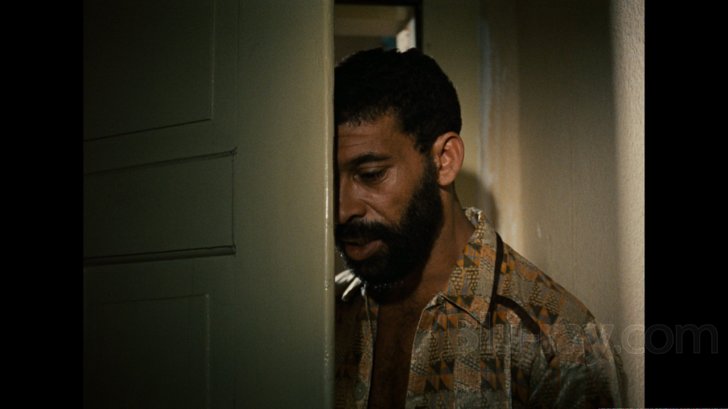
"I can't sleep..."
They meet in a small bar. Ali (El Hedi ben Salem, The Merchant of Four Seasons) and his friends frequently go there to have a few beers, listen to their favorite music and talk about their relatives back home in Morocco. Emmi (Brigitte Mira, The Enigma of Kaspar Hauser) enters the bar to escape the heavy rain.
Ali buys Emmi a Coke and then they dance. Later on, he accompanies Emmi to her place and she offers to make him a cup of coffee. Even though Ali is a lot younger than Emmi and his arsenal of German words limited, the two quickly discover that they have plenty in common.
A few days later, Ali and Emmi decide to marry. Emmi’s neighbors immediately complain to the landlord that a foreigner has made his building unsafe. Then the owner of the local grocery store decides to make a statement and refuses to sell Ali a box of margarine. When Emmi introduces Ali to her children and their families, they also go berserk. Even the elderly women with whom Emmi has been working with for years exclude her from their lunch breaks after they realize that she has welcomed an Arab in her life.
Ali isn’t bothered by the daily dose of racial slurs and angry looks, but Emmi has a difficult time enduring them. For awhile she does her best to be polite with everyone, but eventually the masks she has been wearing begin to crack. Around the same time, Ali begins questioning his decision to marry Emmi and starts spending more time with his friends.
There is a very obvious relationship between Rainer Werner Fassbinder’s Ali: Fear Eats the Soul and Douglas Sirk’s All That Heaven Allows -- in both films younger men fall in love with older women; also, the communities in which the main protagonists exist react in similar ways and quickly make it clear that they aren’t willing to tolerate the risky relationships.
Fassbinder’s film, however, is far more intense. Racism, moral hypocrisy, and post-war frustration are only a few of the key themes in it that make it impossible to regard it as a romantic film. Yes, love is frequently mentioned, but it is loneliness and alienation that are dictating how people interact with each other.
In both films the women are stronger than the men, but they connect with them for different reasons. In All That Heaven Allows there is a real spark, a real sexual attraction between Jane Wyman’s widow and Rock Hudson’s handsome gardener. In Ali: Fear Eats the Soul Ali and Emmi simply fill voids left by someone else.
The two films treat color with a similar attention, but its function is also different. In All That Heaven Allows the carefully selected vivid colors reveal plenty about the personalities and social status of its characters. In Ali: Fear Eats the Soul the colors are colder, somber and darker, just like the world in which Ali and Emmi are living in.
Mira and Salem are excellent together. Their acting styles are drastically different but most appropriate for this film. Fassbinder also steps in front of the camera as Eugen, the jaded husband of Emmi’s daughter, Krista.
Ali: Fear Eats the Soul was lensed by cinematographer Jürgen Jürges, who collaborated with Fassbinder on a number of different films (Satan’s Brew, Effi Briest). His credits also include Uli Edel’s Christiane F. and Michael Haneke’s Funny Games.
Ali: Fear Eats the Soul Blu-ray Movie, Video Quality 
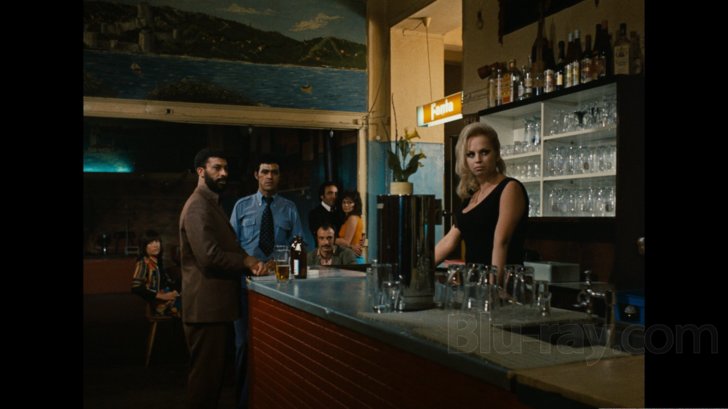
Presented in its original aspect ratio of 1.37:1, encoded with MPEG-4 AVC and granted a 1080p transfer, Rainer Werner Fassbinder's Ali: Fear Eats the Soul arrives on Blu-ray courtesy of Criterion.
The following text appears on the leaflet provided with this Blu-ray release:
"Supervised by director of photography Jurgen Jurges, this new digital transfer was created in 4K resolution on an ARRISCAN film scanner from the original camera negative at ARRI Film & TV in Munich, where the film was restored. The original monaural soundtrack was remastered at 24-bit from the 17.5mm magnetic track. Clicks, thumps, hiss, hum, and crackle were manually removed using Pro Tools HD, AudioCube's integrated workstation, and iZotope RX 3.
Transfer supervisor: Jürgen Jürges.
Colorist: Traudl Nicholson/ARRI Film & TV, Munich."
The film looks mighty impressive. The numerous close-ups -- and they are an integral part of the film's visual design -- look incredibly beautiful. At times one can literally see tiny facial pores that are simply missing from the old R1 DVD release. The outdoor footage has wonderful fluidity and clarity is simply outstanding (see screencaptures #5 and 19). The high-quality scanning has ensured that grain is exceptionally well resolved and distributed. Also, there are no traces of compromising sharpening adjustments. As a result, the entire film has a very solid and very pleasing organic appearance. Overall image stability is outstanding. Finally, there are absolutely no scratches debris, cuts, damage marks, stains, or warps to report in this review. All in all, this is easily the very best high-definition presentation of a Rainer Werner Fassbinder film that I have seen to date. It is magnificent. (Note: This is a Region-A "locked" Blu-ray release. Therefore, you must have a native Region-A or Region-Free PS3 or SA in order to access its content).
Ali: Fear Eats the Soul Blu-ray Movie, Audio Quality 

There is only one standard audio track on this Blu-ray release: German LPCM 1.0. For the record, Criterion have provided optional English subtitles for the main feature.
The film does not have a prominent music score. (There are only a couple of sequences where the immigrants listen to Arabic music). Naturally, the the overall dynamic movement is very limited. The dialog is exceptionally crisp and clean, stable, and very easy to follow. For the record, there are no pops, crackle, audio dropouts, or digital distortions to report in this review.
Ali: Fear Eats the Soul Blu-ray Movie, Special Features and Extras 
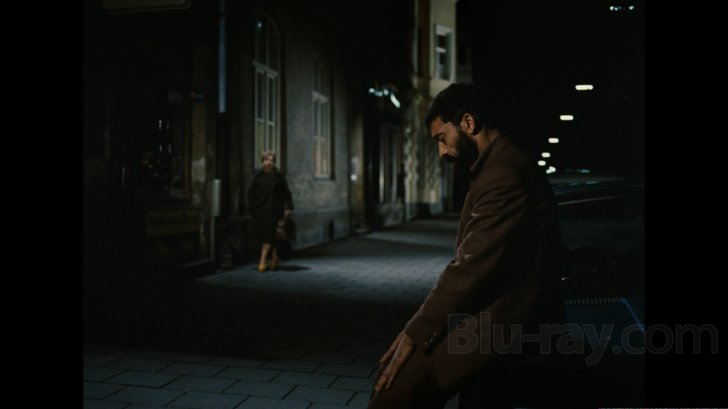
- Trailer - original trailer for Ali: Fear Eats the Soul. In German, with optional English subtitles. (3 min, 1080i).
- Angst isst Seele auf - presented here is director Shahbaz Noshir's short film Angst isst Seele auf a.k.a. Fear Eats the Soul (2002), which deals with the same issues Rainer Werner Fassbinder's film does. (In this film, an immigrant is attacked by a group of neo-Nazis). Brigitte Mira, who played Emmi in Ali: Fear Eats the Soul, has a small role in the film. Cinematographer Jurgen Jurges and editor Thea Eymesz, who worked with Rainer Werner Fassbinder's on the original film, also contributed. In German, with optional English subtitles (13 min, 1080i).
- Todd Haynes - in this archival interview, director Todd Haynes (Safe, Velvet Goldmine) recalls how he became aware of Rainer Werner Fassbinder and his work, and discusses the key socio-political overtones in his films, the influence of Douglas Sirk's All That Heaven Allows on the German director and Ali: Fear Eats the Soul, the relationship between Emmi and Ali, etc. The interview was conducted exclusively for Criterion in Portland, Oregon, in 2003. In English, not subtitled. (23 min, 1080i).
- Brigitte Mira - in this archival interview, actress Brigitte Mira recalls how she was approached by Rainer Werner Fassbinder to play Emmi in Ali: Fear Eats the Soul, and discusses the shooting process, the script, the German filmmaker's directing methods, her interactions with actor El Hedi ben Salem (and his apparent difficulty finding a real partner), etc. The interview was conducted exclusively for Criterion in 2003. In German, with optional English subtitles. (25 min, 1080i).
- Thea Eymesz - in this archival video interview, editor Thea Eymesz, who assisted Rainer Werner Fassbinder on a number of different films (The Bitter Tears of Petra von Kant, Gods of the Plague), discusses her collaboration to Ali: Fear Eats the Soul. The interview was conducted exclusively for Criterion in Munich in 2003. In German, with optional English subtitles. (23 min, 1080i).
- Signs of Vigorous Life: New German Cinema - presented here is an episode of the British television program Omnibus which focuses on the New German Cinema movement. Included in it are clips from archival interviews with Rainer Werner Fassbinder, Volker Schlöndorff (The Tin Drum), Wim Wenders (Paris, Texas), and Werner Herzog (Nosferatu the Vampyre), amongst others. The episode, which is hosted by Humphrey Burton, originally aired on February 12, 1976. In English, not subtitled. (33 min, 1080i).
- From The American Soldier (1970) - in 1973, Rainer Werner Fassbinder wrote: "I had already used the story (of Ali: Fear Eats the Soul) in a film once. It was actually in The American Soldier, where it was told by a chambermaid in a long sequence where the girl sits on a bed." This sequence, featuring the great Margarethe von Trotta, is presented here. In German, with optional English subtitles. (3 min, 1080i).
- Leaflet - illustrated leaflet featuring Chris Fujiwara's essay "One Love, Two Oppressions", and technical credits.
Ali: Fear Eats the Soul Blu-ray Movie, Overall Score and Recommendation 
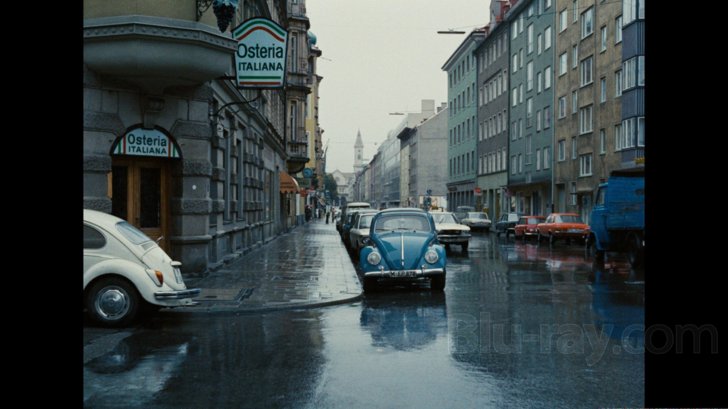
Rainer Werner Fassbinder's Ali: Fear Eats the Soul may look slightly dated, but its message is still very much relevant today. It pays homage to Douglas Sirk's strikingly beautiful All That Heaven Allows, which was also released on Blu-ray earlier this year. Both films have been recently restored and both look absolutely stunning now. I consider them two of the best additions to Criterion's catalog. VERY HIGHLY RECOMMENDED.
Similar titles
Similar titles you might also like

The Bitter Tears of Petra von Kant
Die bitteren Tränen der Petra von Kant
1972

The Marriage of Maria Braun
Die Ehe der Maria Braun
1978

The Secret of the Grain
La graine et le mulet
2007

The Merchant of Four Seasons
Händler der vier Jahreszeiten
1971

Fox and His Friends
Faustrecht der Freiheit
1975

The Other Side of Hope
Toivon tuolla puolen
2017

Like Someone in Love
ライク・サムワン・イン・ラブ / Raiku samuwan in rabu
2012

Beau Travail
1999

Chungking Express 4K
重慶森林 / Chung Hing sam lam
1994

Code Unknown
Code inconnu: Récit incomplet de divers voyages
2000

Loveless
Нелюбовь / Nelyubov
2017

Bicycle Thieves
Ladri di biciclette
1948

Right Now, Wrong Then
지금은맞고그때는틀리다
2015

Aquarius
2016

Out 1
Out 1, noli me tangere
1971

Metropolis
The Complete Metropolis
1927

Le Havre
2011

An Autumn Afternoon
秋刀魚の味 / Sanma no aji
1962

Vivre sa vie
Vivre sa vie: Film en douze tableaux / My Life to Live
1962

Force Majeure
Turist
2014